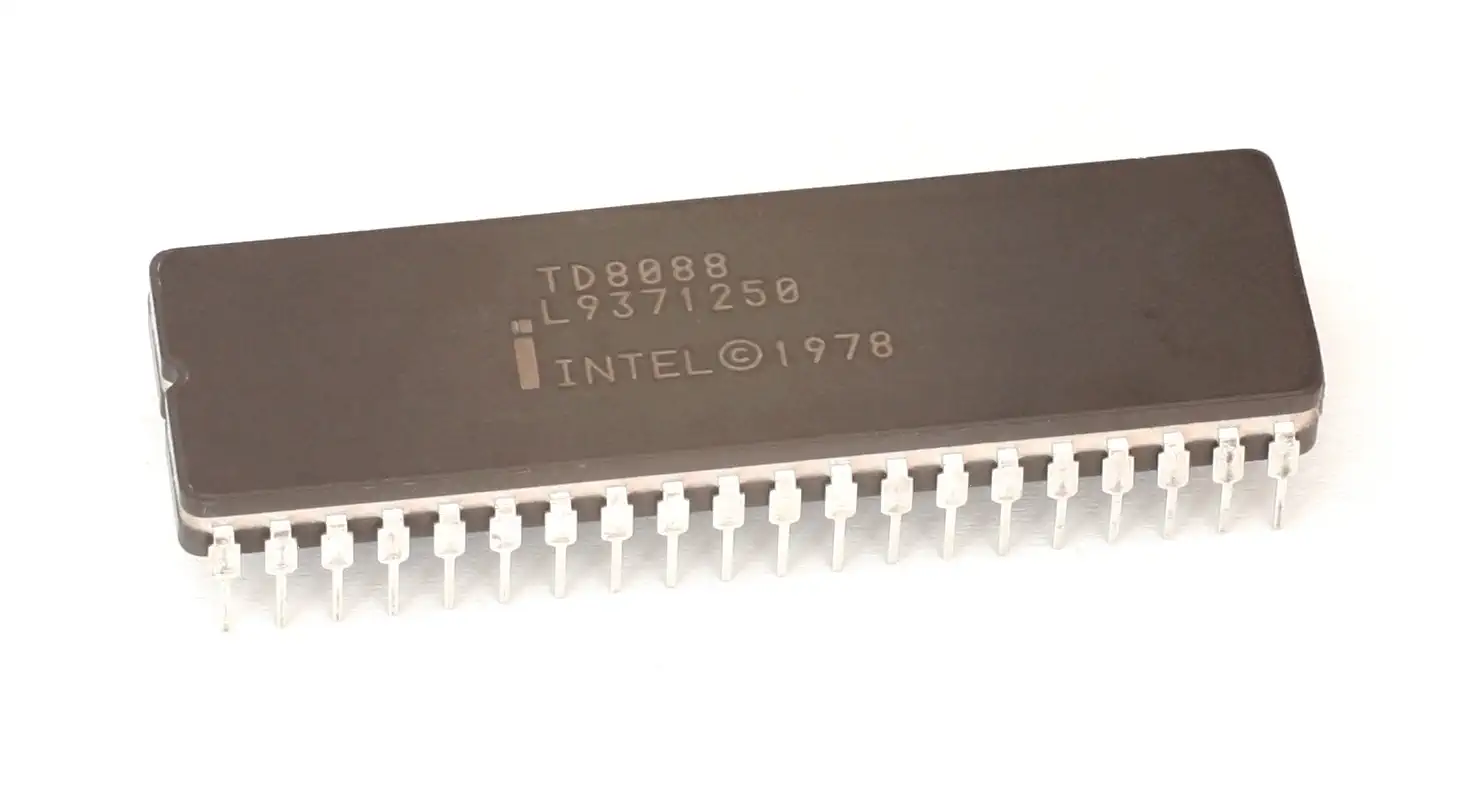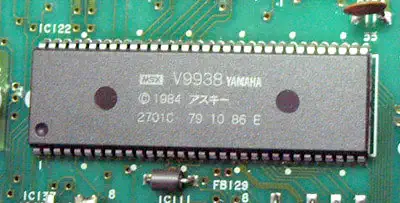SpectraVideo 838
Intel 8088 CPU
The Intel 8088 microprocessor is a variant of the Intel 8086. The 8088 has an 8-bit external bus instead of the 16-bit bus that the 8086 has. The 16-bit registers and the 1MByte address range are unchanged, however. The 8086 and the 8088 have the same execution unit (EU), only the Bus Interface Unit (BIU) differs.
The original IBM PC architecture is based on the Intel 8088. The CPU runs at 5 to 16 MHz, has a 20-bit address bus and can work together with the 8087 Co-Processor. The 8088 was launched in 1979. The 8088 is compatible with the Intel 8085.

Programmable Sound Generator (AY-3-8910 compatible PSG)
The AY-3-8910 is a 3-voice Programmable Sound Generator, or PSG. It was designed by General Instrumet in 1978 for use with their own 8-bit PIC1650 and their 16-bit CP1610 computers.
The PSG is widely used in many arcade cabinets, pinball machines, and many micro-computers. Here is a list of some of the major brands of computer that used the AY-3-8910:
- Intellivision
- Vectrex
- Amstrad CPC range
- Oric-1
- Color Genie
- Elektor TV Games Computer
- All MSX-1 and MSX-2 computers
- ZX Spectrum home computers
General Instrument spun of MicroChip Technology in 1987 and the chip was sold under the MicroChip brand, and licensed to Yamaha as the YM2149F which the Atari ST range of computers use. Functionally the PSG is very similar to the Texas Instruments SN76489.
Variants:
-
AY-3-8910
Comes with 2 general purpose 8-bit parallel I/O ports, used for Keyboard and Joystick in for instance MSX. -
AY-3-8912
Same chip, but in a 28-pin package. Parallel port B is not connected to save cost and space. -
AY-3-8913
Same chip, but in a 24-pin package. Both parallel ports are not connected. -
AY-3-8914
The AY-3-8914 has the same pinout and is in the same 40-pin package as the AY-3-8910, except the control registers on the chip are shuffled around, and the 'expected input' on the A9 pin may be different. It was used in Mattel's Intellivision console and Aquarius computer. -
AY-3-8930
Backwards compatible but BC2 pin is ignored
YM2149F -
YM3439-D
CMOS version of the Y2149 in 40-pin DIP -
YM3439-F
CMOS version of the Y2149 in 44-pin QFP -
YMZ294
Variant of the YM3249 in an 18-pin package. Parallel ports not connected, and all sound channels mixed on 1 port. -
T7766A
Toshiba variant of the AY-3-8910, fully compatible. Used in some MSX models. - Winbond WF19054, JFC95101, and File KC89C72: Fully compatible versions of the AY-3-8910 produced for slot machines.
Yamaha Produced chip, same pin-out as the AY-3-8910, but pin 26 could halve the master clock. Can be used to replace the AY-3-8910 if pin 26 is left disconnected.
V9938 Video Display Processor
The V9938 is a video display processor developed by Yamaha. It is mainly used on MSX2 computers, but also in teh Tatung Einstein 256 and the Geneve 9640 enhanced TI-99/4A clone. Some MSX-1 computers used it with 16kByte of memory to enable a 80 column text display
Specifications:
- Video RAM: 16-192 KByte
- Text mdoes: 80x24, 40x24, 32x24 (with sprite capability and multi-color)
- Graphics: 512x212 (16 colors from 512), 256x212(16 colors from 512) and 256x212 in 256 colors
- Sprites: 32 sprites, 16 colors (2 per line), 8 sprites per scanline
- Hardware Accelleration for copy, line, fill and logical operations
- Interlacing for doubling of resolution
- Vertical scroll register
- Clock: 21 MHz
- Superposition and digitization capabilities
- Video Output: 15 kHz
- Support for lightpen and mouse<

VRAM: 128kB
16kB VRAM for CGA Sound Chip General Instruments AY-3-8910 Programmable Sound Generator Sound 3 wave channels + white noise Display Chip Yamaha V9938 VDP & CGA Display CGA text & Graphics
MSX2 text & Graphics
Best Text 80x25 Best Color 256 simultaneous, or 16 out of 512 colors Best Graphics 512x424 interlaced Sprites 16 colors out of 512, 16x16, 8/scanline, 64 total System OS MS-DOS Storage 5.25" Double Density disk drive (360kB)

